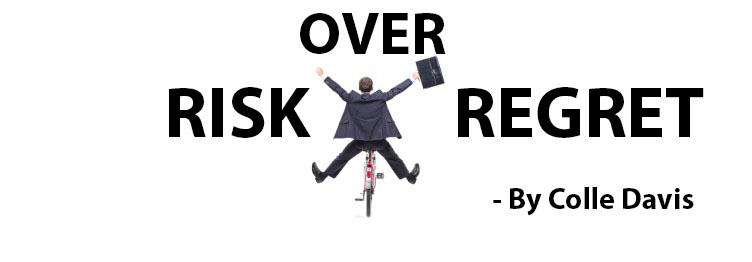Six Steps to Choose Risk Over Regret
– By Colle Davis

 Today is the day to explore taking risks over regrets.
Today is the day to explore taking risks over regrets.
Ask an older person about their life. At some point, most will wax eloquently about their regrets and not take risks when presented with a good opportunity. The lists range from moving to a new state, taking a new job, meeting their future spouse, raising children, being single, or any of a million stories reinforcing the idea that life is full of opportunities. Yet, near the end of the day, some people regret never taking that extra risk for a greater reward. Darn It.
“The early bird gets the worm.” “To the victor go the spoils.”
What has to happen for you to correlate risk-taking with having a better chance at success? By not taking that risk, you will never know what direction your life might have taken.
Grab a notebook and list your reactions to these six steps and uncover your risk levels.
Clarity is the most powerful tool there is for change. (Memorize this phrase.)

- What are you afraid of? This step takes practice because unless you identify the full scope of your fears, you cannot address them. Make a quick list.
- Stop listening to your internal criticisms. Instead, learn to ignore them by using techniques such as snapping a rubber band around your wrist or using affirmations to quiet the voices in your head. Think of two ways you can use to create awareness of your internal critisims.
- Paint a picture in your thoughts about the results you expect after taking your risks. What do you want for an outcome? Draw a rough sketch in your notebook or hold those images in your thoughts.
- Go slowly. Begin by listing ideas, tasks, and contacts who might help you. You can use gibberish or poor handwriting in your notebook if you are nervous about someone finding it. The point is to use your notebook to create clarity for yourself.
- Celebrate yourself for taking risks and having positive outcomes because of your courageous behaviors. Plan and rejoice in your wins, which will ingrain risk-taking in all areas of your life, including your relationships and career. Then, go big and allow yourself to have some fun.
- What recent risks have you been taking in your life? Think of three and put them in your notebook. Include contacting people you do not know but want to know. It can be a list of behaviors to improve your health. Professionally, it can be extra classes, networking, or coaching to improve your job performance.
If your life is not in danger, you can take risks toward success. If you fail, you will have learned what did not work. Even if you get bruises or scrapes, you have learned something you can use in the future.

That which does not kill you makes you smarter (not stronger).
Personal experience. I was injured and almost died in a war incident that resulted in the removal of my left lung. I spent months in a military hospital recovering. The experience made me much smarter about being in violent situations, like a war. The incident left me disabled but wiser.
What fears can you overcome to accept a higher level of risk? Do you need more information, support, coffee, or what? The fastest way to grow and advance is to take more risks. Of course, I am not talking about engaging in risky behavior; but rather creating or seizing opportunities as they arrive. By practicing risk-taking, you are taking the chance to meet unexpected openings, which enhance your life.

By not taking risks, you become stagnant and suffer from a lack of spontaneity. As a result, you become will be lonely and without joy. That’s a sad end to life when someone entering their Golden Years.
As stated earlier, take small risks. For example, ask your boss a question or a peer about something you do not understand. Be bold and live a little!
Onward to implementing calculated risks! For more tips and tricks for creating your own plans for Risks Over Regrets, contact me, Colle Davis, cd****@*****ch.com or 804-467-1536 (EST), or set up a complimentary meeting via Zoom.
